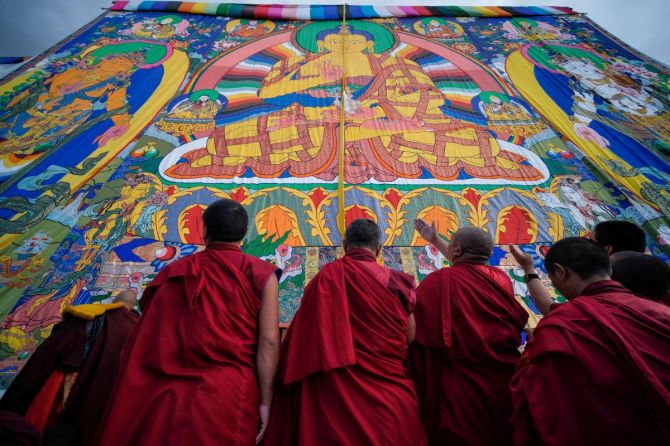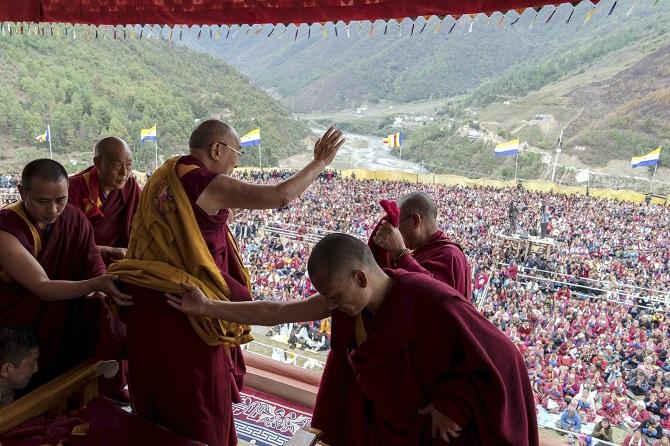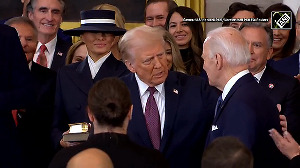'The Bharat Ratna should have been given a long time ago.'
'Not just to irk the Chinese, but to recognise His Holiness for what he is and how we have benefited immensely from his presence in India.'
'I don't think there has been a better ambassador for India's philosophical and cultural past than the Dalai Lama.'

"I would not be too worried about the Chinese designs in Arunachal Pradesh because Arunachal is well and truly integrated into India with very strong leaderships over there,' says Amitabh Mathur, former senior Research and Analysis Wing officer and former advisor to the Union home ministry on Tibetan affairs.
Mr Mathur played a key role in the framing of the Tibetan Rehabilitation Policy of 2014 which provides guidelines about the facilities extended to Tibetan refugees by the Government of India.
In part 2 of the interview with Rediff.com's Archana Masih, Mr Mathur discusses how India had kept the Tibetan civilisational struggle for its unique identity alive.
"That's a great success story of India's Tibetan policy," he says. "India's failure would be if we were to dilute this support to the Tibetan people."
In your vast experience, what changes would you advocate in our day Tibet policy, especially in view of the Ladakh standoff with China?
The Tibetan exile community is a very unique example. 61 years since coming out of Tibet, they still are very optimistic and united as a people.
Their faith in the Dalai Lama is as unshaken. It is largely due to his magnetic personality and also because India has provided the conditions in which Tibetan culture religion and unique identity has not only survived outside Tibet, but flourished.
Tibetans have built many monuments and monasteries in India.
This has kept the Tibetan civilisational struggle for its unique identity alive. That's a great success story of India's Tibetan policy.
India's failure would be if we were to dilute this support to the Tibetan people.
The changes that I would suggest personally and in a private capacity is that we be forthcoming in our support to His Holiness by stating that the reincarnation of the Dalai Lama is his business alone.
The Chinese have said that they will decide the next Dalai Lama.
The US has come out strongly in support of the Dalai Lama and passed the Tibetan Policy and Support Act in the US House of Representatives. It is now in the US Senate.
(If enacted, the bill would establish official US policy supporting the selection of Tibetan religious leaders, including His Holiness the Dalai Lama, by the Tibetan Buddhist community -- free of Chinese government interference.)
India too should adopt this line -- that it is up to the Dalai Lama to decide his successor.
India should also strengthen its support to the Central Tibetan Administration.
We do not recognise the Central Tibetan Administration as a government in exile. It was basically a vehicle set up to enable the Tibetans to live in India the way they lived in Tibet.
De facto it is a government in exile and we must continue to extend our support to it, strengthen it and strengthen the international campaign for Tibet.
And since the SSF has become a factor in the current situation, I think let the Tibetans in Tibet know what is happening.
Is it time to leverage the SSF and the Tibetan factor against China? On the other hand, what impact is that likely to have in Arunachal Pradesh which China lays claim to?
The Chinese would certainly react if our diplomatic efforts do not find a quick solution and the situation drags on into, God forbid, to an escalation of conflict.
The Chinese do feel vulnerable in Xinjiang and Tibet.
Given the past involvement of the Chinese in India's north eastern insurgencies -- (the outlawed United Liberation Front of Asom leader) Paresh Barua was based in China after all till sometime back.
If China would resort to something like that, again, it will need to take into consideration what impact it will have on China's relationship with the ASEAN countries.
I would not be too worried about their designs in Arunachal because Arunachal Pradesh is well and truly integrated into India.
There is no local movement like ULFA in Assam or the Naga insurgents. India has done very well in Arunachal and we have very strong leaderships over there.
The issue is what will happen within Tibet.
If the Chinese are nervous, they will come down with a very heavy hand like they did in 2008 and the Dalai Lama will not be comfortable about that.
So whatever India does should be in consultation with the Tibetan leadership. I'm not saying officially, but they know what is happening within Tibet better than anyone else.

Do you think it is time India confers the Bharat Ratna on the Dalai Lama?
It is already overdue; it should have been given a long time ago.
Not just to irk the Chinese, but to recognise him for what he is and how we have benefited immensely from his presence in India.
I don't think there's been a better ambassador for India's philosophical and cultural past than the Dalai Lama.
It should be in recognition of the man rather than as a card on a chessboard because that would be an insult to a great person.
Also, the people of India think very highly of him and they too have a relationship with him over the years.
Yes, he has struck a very deep relationship with the Indian people. When he met President George W Bush, he spoke a lot about India's past and the various streams of religions that flourish in India.
He has a deep devotion to India because he sees his religious and philosophical origins from Nalanda.
That is the reason why most of the important Tibetan monks who came to India in 1959 and their reincarnation have stayed behind in India.
They had the option of going to the West because Tibetan Buddhism is actually very popular in the West.
They are welcomed with open arms and their donors come from the West, but they stay here because of this deep spiritual connection they have with India.
I think that is something we need to honour in His Holiness and the people of Tibet.

His Holiness stopped between Tawang and Bomdila to consecrate the Thupsung Dhargyeling monastery in Dirang and and deliver teachings. Photograph: PTIP
In view of the stand-off with China, do you think India is likely to be more open and reach out more to the Dalai Lama?
India has always been open about His Holiness.
A couple of years back, he visited Arunachal.
He is treated as a very respected religious leader and as a religious leader, he travels where he wants and there has never been any restriction to him.
Every summer he would go to Ladakh and has been all over India.
I don't think we have tied him down or put restrictions on him of any sort.
We must also not forget for a moment that His Holiness was brought up not only to be the spiritual leader of Tibet, but also the temporal leader.
He is as tutored in religious matters as he is in statecraft. He understands how States conduct business between each other and knows where the red lines are.
He knows what to do and what not to do.
Feature Presentation: Aslam Hunani/Rediff.com











 © 2025
© 2025